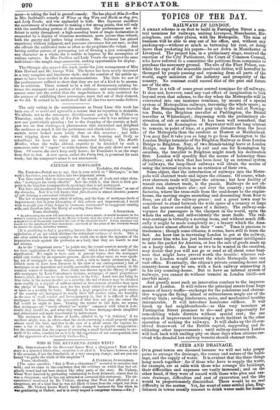EXPENSE OF MORTGAGES.
Yorkshire, 6th October. Ma. Enrron—Permit me to say, that in your article on " Mortgages," in last week's Spectator, you have fallen into two important errors. You have stated, that in consequence of the length of deeds and other obsta- cles," mortgages are rarely effected." Now the truth is, that there is little pro- pertyin the kingdom (comparatively speaking) that is not mortgaged.
You have also mentioned the cumbersome proceeding of "foreclosure" as one of the obstacles. Now it is well known that foreclosure is almost obsolete; powers of sale forming a convenient substitute. The law of mortgage may admit of reform, and the form of mortgage-deeds of improvement; but in your advocating of this reform and improvement, I would wish to acquit you of any design by erroneous statements* to exaggerate existing evils, and therefore take the liberty of sending these lines.
In advocating the new bill introducing short conveyances, (a useful measure, in the writer's opinion,) It was stated in the House of Lords, that the cost of a deed conveying a small freehold frequently equalled the cost of the freehold itself ! Every attorney can vouch for the falsehood of that statement—one-tenth of the price of the freehold would be nearer the mark, including stamps.
[It is gratifying to find a practising lawyer, like our correspondent, expressing approbation of an act which abridges the redundant verbiage of deeds. This is one other added to the many examples we could cite to show the injustice of the imputation made against the profession as a body, that they are hostile to real law reforms.
As to the "important errors" he points out, the second consists merely of the too loose application of the word "foreclosure," which has a definite and limited signification. We ought to have said, in general terms, that the mortgager could only realize by an expensive process. As to the other error, we were speak- ing not of mortgages on large estates, with a view to family settlements, &c., (which seem to have been foremost in the view of our correspondent,) but of mortgages as an immediate and readily-accessible means of raising money in the common course of business. Since doubt was thrown upon the efficacy of equit- able mortgages by Lord Cottenham's decision, mortgages of small properties— houses, lands, &c.—are far from favourites in the City. Land does not bring its true value in the money-market as a security; the use of money may be obtained more readily on a deposit of railway-shares or Government securities than upon the pledge of land. Hence, men are less ready either to offer or accept houses or lands as a security for loans. Though a large proportion of the great estates of the country are mortgaged to nearly their full market value, the hardship in the case of small estates and house-property is, that it is difficult to effect mortgages on them—that the possession of land does not give the owner the fall credit be ought to have. Viewing the matter in this light, we repeat, that mortgages are "rarely effected,"—a rarely" compared with what it is de- sirable they should be, and what they would be were mortgage-deeds simplified and abbreviated and made transferable by indorsement. The statement in the House of Lords, alluded to by "A Solicitor," if we recollect aright, was, in effect—that the deeds conveying a small property might almost cover the land, and that in the case of a small estate the expense be- came a bar to the sale. The size of the deeds was a playful exaggeration : but the statement that the expense of conveying a small freehold amounts to one- tenth of its value, vouched for as it is by the experience of our correspondent, has all the appearance of a melancholy truth.—ED.]


























 Previous page
Previous page